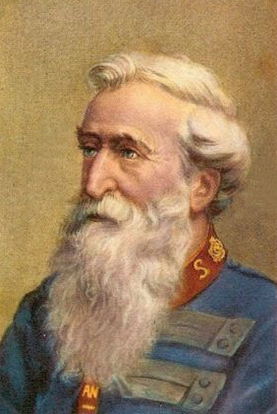
In 1849, Booth moved to London, where he joined the Methodist Reform Church and preached for them in a number of assignments. But his pastoral duties meant he was unable to accept many requests to do evangelistic campaigns. Frustrated with this situation, in 1861 Booth resigned from the Methodist ministry and became an independent evangelist. He began to draw crowds of listeners as he preached in the streets and commons of London, and in 1865 he was invited him to lead a series of meetings in a large tent in London’s impoverished East End at which he brought the gospel to a great many of the poor and destitute.
Booth realized this was his calling and later that year he and his wife Catherine opened ‘The Christian Revival Society’ – later renamed ‘The Christian Mission’ for which they held daily meetings attended by many of the poor and homeless along with social outcasts such as alcoholics, petty criminals and prostitutes. The need was vast and The Christian Mission was only one of some 500 religious and charity groups working with the poor in the East End of London. But a turning point occurred in 1878. Booth was dictating a letter and after saying “We are a volunteer army...” one of his sons objected that they were, in fact, “regulars” and so the word "volunteer" was changed to “salvation.”
Thus the “Salvation Army” was born and, as it developed, modelled after the military. Booth became the Army’s “General” and his co-workers were made "officers.” Other members became “soldiers” and all wore the Army’s uniform for the missionary and charitable work they performed. The success of the Salvation Army was profound and in the late 1880s it extended its humanitarian and religious work to the United States and several European countries, eventually spreading throughout much of the world. Booth travelled extensively and saw the Movement established in almost 60 countries and colonies in his own lifetime.
But the Army’s success, and some of its positions, met with opposition from a number of quarters such as the alcohol industry, which realized that the work of the Movement would significantly cut drinking among the poor. Groups were formed to oppose the Salvationists and clashes led to the deaths of several of them, with many others – including women and young teens - being injured. Much about the Army was misunderstood and misinterpreted and Booth was often personally criticized, insulted and ridiculed. Yet even many of his detractors eventually came to see the good work he and his Salvation Army were undeniably doing.
This was a clear example of letting one’s light shine and eventually the Press, the Church of England, and others who had been initially cautious about the movement came to accept it. When Booth died in 1912, some 40,000 people attended his funeral, including England’s Queen Mary. Despite opposition and discouragement, William Booth had persisted in fulfilling his calling. His work, continued in the Salvation Army he founded, has brought hope and help to the lives of millions.








 RSS Feed
RSS Feed
